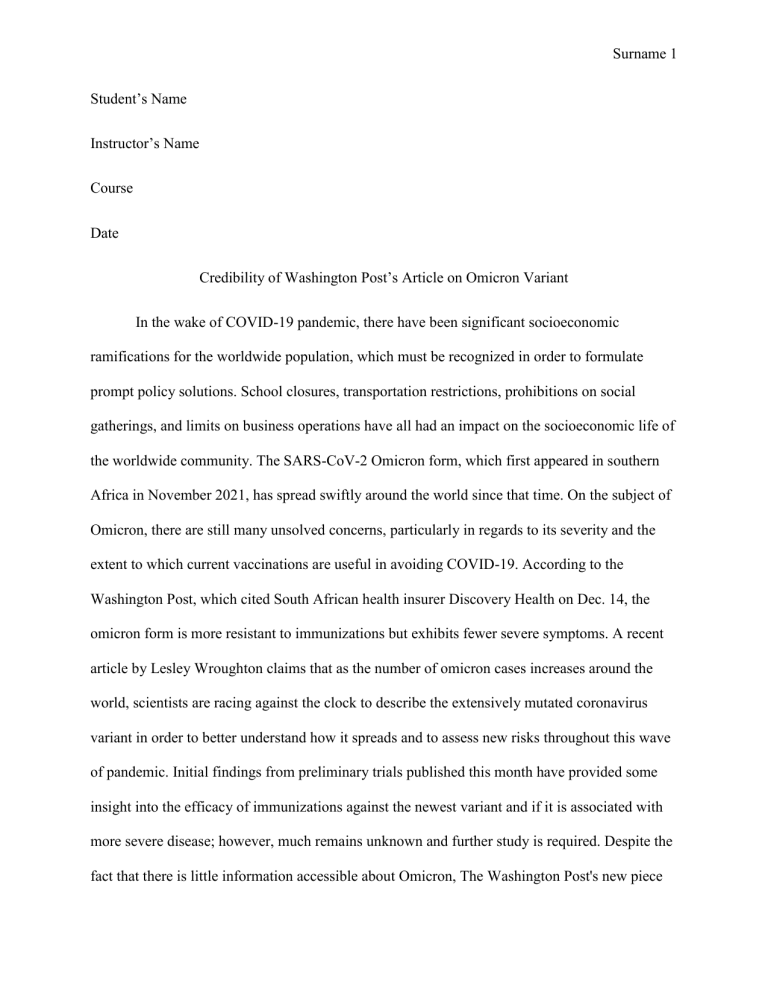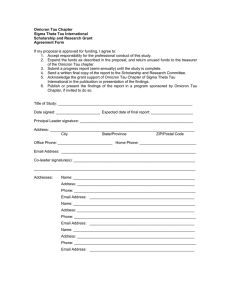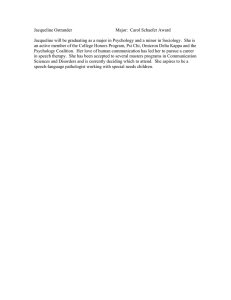Omicron Variant: Washington Post Article Credibility Analysis
advertisement

Surname 1 Student’s Name Instructor’s Name Course Date Credibility of Washington Post’s Article on Omicron Variant In the wake of COVID-19 pandemic, there have been significant socioeconomic ramifications for the worldwide population, which must be recognized in order to formulate prompt policy solutions. School closures, transportation restrictions, prohibitions on social gatherings, and limits on business operations have all had an impact on the socioeconomic life of the worldwide community. The SARS-CoV-2 Omicron form, which first appeared in southern Africa in November 2021, has spread swiftly around the world since that time. On the subject of Omicron, there are still many unsolved concerns, particularly in regards to its severity and the extent to which current vaccinations are useful in avoiding COVID-19. According to the Washington Post, which cited South African health insurer Discovery Health on Dec. 14, the omicron form is more resistant to immunizations but exhibits fewer severe symptoms. A recent article by Lesley Wroughton claims that as the number of omicron cases increases around the world, scientists are racing against the clock to describe the extensively mutated coronavirus variant in order to better understand how it spreads and to assess new risks throughout this wave of pandemic. Initial findings from preliminary trials published this month have provided some insight into the efficacy of immunizations against the newest variant and if it is associated with more severe disease; however, much remains unknown and further study is required. Despite the fact that there is little information accessible about Omicron, The Washington Post's new piece Surname 2 fits the criteria for evaluating news sources, which are currency, relevance, authority, and accuracy. In response to a vaccination, the immune system is stimulated to make antibodies, which remain in your body and are used to fend off future viral exposure and infection. In clinical testing, all three vaccinations, the Pfizer-BioNTech, Moderna, and Johnson & Johnson vaccines, shown remarkable efficacy and safety. According to Apoorva Mandavilli, countries must take additional mitigation measures because the omicron variant contains more than 30 mutations to the virus' spike proteins, which cover the outside of the virus and are the primary targets of vaccines and treatments such as monoclonal antibodies. I agree with Apoorva Mandavilli's assessment that countries must take additional mitigation measures. Some readers may disagree with my point of view, claiming that Omicron generates more severe symptoms when compared to its Delta counterpart. So, according to one reliable source, researchers are working together to gather information on the new Omicron variant's capabilities as well as how well the current vaccines will defend against it. Early results paint a tangled picture of the situation. According to researchers who spoke with Reuters, the variety may be more transmissible and better able to avoid the body's immune responses, both to vaccination and natural infection, than previous generations of the virus. The vaccinations may well continue to protect against serious sickness and death, however booster doses may be required in order to protect the majority of the population. The manufactures of Pfizer-BioNTech and Moderna, on the other hand, are prepared to reformulate their injections if this becomes required. My reaction is that recent tests have revealed that BioNTech only gave 33 percent protection against infection, which is much lower than the degree of protection provided by other variants discovered in the world (Sheikh, Aziz, et al. 4). At the same time, the vaccination may provide 70 percent protection against being Surname 3 admitted to the hospital with omicron, according to the findings of the research, which described this degree of protection as acceptable. The importance of the current COVID-19 research is further underscored by the fact that Omicron is related with a two-thirds reduction in the likelihood of COVID-19 hospitalization when compared to Delta. According to the findings of a study conducted by Discovery Health, South Africa's leading health insurance, the probability of hospitalization among adults who contracted covid-19 was 29 percent lower than it was during the original pandemic wave that arose in March of this year. When compared to more than 25 weeks after the second vaccine dose, the booster dose of immunization provides significant extra protection against the risk of symptomatic COVID-19 for Omicron, despite the fact that it provides the best protection against Delta. I concur with Kathy Leung and Wu Joseph's paper in The Lancet, which states that existing vaccinations provide only minimal protection against COVID-19 mutations. Apart from that, I would like to remind out that the evolving nature of SARS-CoV-2 variants makes the present vaccinations worthless, since they were developed particularly for earlier variants and are no longer effective. Individuals who have received two doses of the Omicron vaccine, according to Pfizer, are susceptible to infection by the virus. A third dosage, on the other hand, enhances antibody activity against the virus. In some cases, booster doses may be necessary to improve the number of antibodies produced and the effectiveness of an individual's immune system to defend them against omicron (Dolgin 3). However, unlike the United States, much of the rest of the globe does not have access to booster doses of the vaccine due to ‘vaccine apartheid’. Furthermore, numerous global-health experts were already averse to massive booster campaigns, despite the fact that vaccination rates are still abysmally low in huge swaths of the world prior to Omicron's entrance. As a result of Omicron, boosters have already sparked Surname 4 controversy about concerns of equality and prioritizing of scarce vaccination supplies. Scientists are concerned that wealthier nations' haste to supply more boosters in response to Omicron could aggravate the global vaccine imbalance (Mahase 1). Many health researchers believe that the present vaccination discrepancy was a contributing factor to Omicron's development and quick spread, and they are correct. The novel variant has the potential to alter the immunological picture. Among the many alterations found in Omicron, only a handful appear to be likely to impair T cells' capacity to identify the virus and assault infected cells. Despite the fact that evidence finally reveals that omicron causes less severe disease than other varieties, World Health Organization Director General Tedros Ghebreyesus has cautioned that the sheer quantity of infections might once again overwhelm unprepared health-care systems (Mahase 2). In the midst of the pandemic, it is vital to remember that vaccine efficiency and effectiveness are determined by a range of factors, including anti-vaccination sentiment and vaccine apartheid policies. The way vaccinations operate will differ slightly from the way they worked in the trials once millions of people have been immunized. The introduction of new variants such as delta and omicron may alter the landscape. It is important to consider the quantity and age of participants in the trials. In addition, the health of people who will be getting the vaccination is critical. In addition, international cooperation and collaboration in the fight against the COVID19 pandemic are expected to become more prevalent in the near future. Several nations have enacted travel bans or tightened restrictions on passengers from certain African countries as a result of the Omicron incident. The United Kingdom, where more than 800 instances of omicron have been identified so far, has placed 11 African nations on its "red list" of places to avoid visiting (Wroughton). This has prompted speculation as to why African countries are being Surname 5 subjected to these restrictions while the variant is also prevalent in many European countries, among other things. As a complement to travel restrictions, the United Kingdom has implemented a number of extra domestic measures, such as advocating that individuals work from home whenever feasible and wearing face masks in numerous indoor public locations, such as movie theaters and cinemas. Nevertheless, some other European nations, including Germany, had already implemented some type of regional or national lockdown prior to the widespread reporting of the variant. It is unknown how the removal of these limitations will be affected by Omicron's discovery. Despite the goals of travel bans, the poor coordination of global prevention programs put the world at the higher risk of global health insecurity. In conclusion, the material contained in this news item demonstrates the legitimacy of the Washington Post as a reliable news source. The majority of early studies indicates that the Omicron form of the coronavirus is more infectious than earlier strains of the virus, but no definite picture of its transmissibility has yet been established. The number of cases in hard-hit areas is growing at an exponential rate, which shows that the variant is highly transmissible, although further study is being conducted. In less than three weeks after Omicron was discovered for the first time in South Africa earlier this month, it has risen to become the dominant variety in the country. It has also surpassed the delta variant in popularity and has become the main type in Europe. Despite this, there is little information available regarding the efficacy of various antiomicron vaccines, much alone information about heterologous vaccination and boosters. Informed formulation and updating of vaccination policies would benefit from a better knowledge of the fading protection provided by various vaccinations. Works Cited Surname 6 Dolgin, Elie. "Omicron is supercharging the COVID vaccine booster debate." Nature (2021): 18. Leung, Kathy, and Joseph T. Wu. "Managing waning vaccine protection against SARS-CoV-2 variants." The Lancet (2021): 1-2. Mahase, Elisabeth. "Covid-19: Do vaccines work against omicron—and other questions answered." (2021): 375. Mandavilli, Apoorva. "Will the Vaccines Stop Omicron? Scientists Are Racing to Find Out." International New York Times, 30 Nov. 2021, p. NA. Gale OneFile: Health and Medicine, link.gale.com/apps/doc/A684164102/HRCA?u=anon~f1dfb815&sid=googleSc holar&xid=8cc4456e. Accessed 27 Dec. 2021. Sheikh, Aziz, et al. "Severity of omicron variant of concern and vaccine effectiveness against symptomatic disease: national cohort with nested test negative design study in Scotland." (2021): 1-8. Wroughton, Lesley. “Omicron variant more resistant to vaccine but causes less severe Covid, major South African study concludes.” https://www.washingtonpost.com/world/2021/12/14/south-africa-omicron-coronavirus/. Accessed 27 Dec. 2021.


